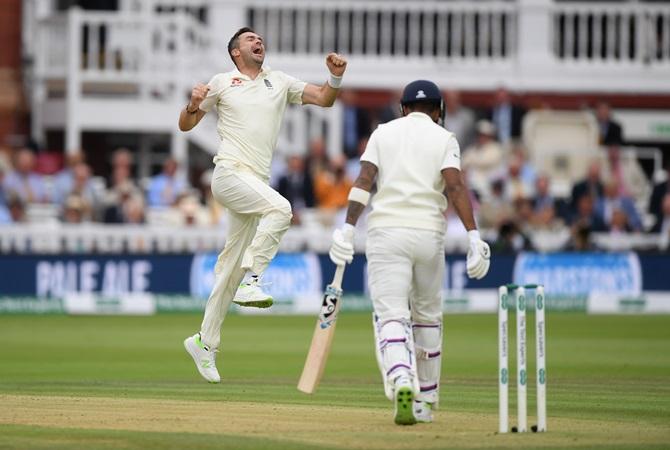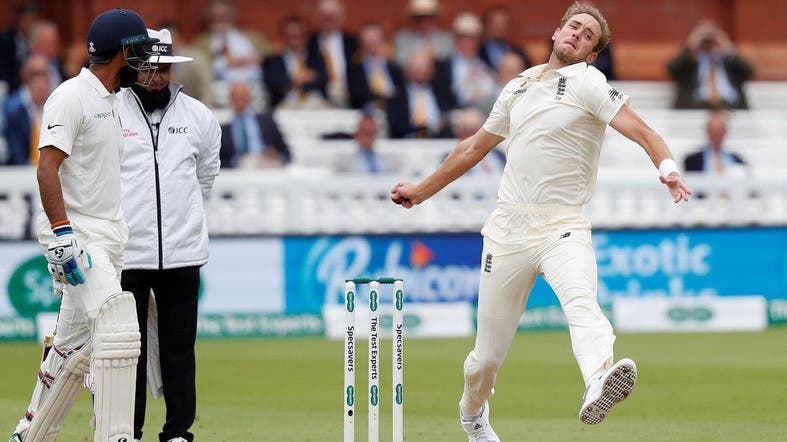Why doesn't India produce more fast bowlers?

As James Anderson (left) said after he and Stuart Broad (right) had skittled India out twice in quick succession in the second Test match at Lords: "We would have bowled out any team under these conditions."

He didn't say that even pace bowlers as old as Broad and me were able to dismiss the best team in the world in next to no time."
One of the things that intrigues me about India's leading position in world cricket is that they've succeeded with some brilliant batsmen and brilliant slow spin bowlers - but with fewer fast bowlers than other national teams, such as. Australia, the West Indies, England and Pakistan.
During one test match against Pakistan years ago (when England were being trounced by their pace attack), I was having breakfast with two Indian students at the Henley Management College.
I asked them why Pakistan always seemed to have had some seriously good fast bowlers (one of whom has just become President of the country) whereas it was more difficult to come up with a list of famous names of fast bowlers from India.
Both of them were agreed that the reason lay in the difference in the main religions of the two countries: "As Hindus, we're far too laid back to exert all the energy needed to bowl faster than medium pace; but Moslems are more aggressive than us so they're not afraid of taking a long run and bowling as fast as they possibly can."
Blogging again
It's 10 years since I started blogging - at the suggestion of journalist Michael Crick, then of BBC's Newsnight, now at Channel 4 News.
It became such a regular obsession that a selection of my blogs was published in my most recent book, Seen and Heard, after which the rate of posting now blogs dwindled for a variety of reasons. Recently, however, I've been updating (i.e. simplifying) the Atkinson Communications website, from which there is now a link to my blog that will make it easier for visitors to find whatever it is that I'm blogging about.
The main problem at the moment is that, silly season though it may be, political news there's so much depressing political news that there's too much to write about!
It became such a regular obsession that a selection of my blogs was published in my most recent book, Seen and Heard, after which the rate of posting now blogs dwindled for a variety of reasons. Recently, however, I've been updating (i.e. simplifying) the Atkinson Communications website, from which there is now a link to my blog that will make it easier for visitors to find whatever it is that I'm blogging about.
The main problem at the moment is that, silly season though it may be, political news there's so much depressing political news that there's too much to write about!
Two depressing sights/sites in Harare
About twenty years ago, I went to Zimbabwe to run a presentation skills course for an American company with branches in almost every country in Africa. One of their managers met me at Harare airport. When he asked "Is this your first time in Africa?", I said "Yes."
"Well just be thankful you've come to Zimbabwe, because they haven't had time to really mess things up yet. Most of the things you take for granted - like phones that work, banks with cash, buses and cabs more or less work - unlike in some of the other African countries where we work. That's why we all opt to hold our meetings here whenever we can."
In this 'popular; country, Mugabe and ZANU-PF had already been in power for quite a while, but they'd yet to set about the country's agriculture and currency was reasonably stable. It also had a flourishing tourist industry, with easy access to world famous sights like the Zambezi and Victoria Falls.
But there were two sites which, even then, before there had been any hint of rampant hyperinflation or the hardline dictatorship of Mugabe, there were two buildings in Harare that I found rather depressing and, in retrospect, realise were totally prophetic of what lay in store for Zimbabweans.
The tower block above had just been finished and is still the highest building in town. It was and is the Reserve Bank of Zimbabwe, standing at 120 metres tall and located (appropriately?) on Rotten Row. Even then, before hyperinflation, the country hardly seemed wealthy enough to spend so much on such a lavish building to house its central bank.
 At the same time, there was another large building still under construction: the new headquarters of Mugabe's ruling political party, ZANU PF, now completed (left).
At the same time, there was another large building still under construction: the new headquarters of Mugabe's ruling political party, ZANU PF, now completed (left).
What worried me then and worries me now is the way that post-colonial Zimbabwe has been so inextricably linked with Mugabe, the Shona-speaking majority and ZANU-PF.
Who now remembers the Lancaster House negotiations, Joshua Nkomo, ZANU, and the Ndebele-speaking minority?
In the last few days we've been reminded of the massacres around Bulawayo and other horrors committed by Mugabe and his cronies in ZANU-PF (not to mention rigged elections, corrupt politicians and bureaucrats).
A political party may at last have seen the error of its ways and ousted Mr and Mrs Mugabe.
ZANU-PF has fired its leader and his wife, but let's not forget that ZANU-PF is a wealthy political party (see the building above) that's both controlled and benefited from running Mugabe's one party state.
Until the party reforms itself, there's little likelihood of free and fair elections in the country.
"Well just be thankful you've come to Zimbabwe, because they haven't had time to really mess things up yet. Most of the things you take for granted - like phones that work, banks with cash, buses and cabs more or less work - unlike in some of the other African countries where we work. That's why we all opt to hold our meetings here whenever we can."
In this 'popular; country, Mugabe and ZANU-PF had already been in power for quite a while, but they'd yet to set about the country's agriculture and currency was reasonably stable. It also had a flourishing tourist industry, with easy access to world famous sights like the Zambezi and Victoria Falls.
But there were two sites which, even then, before there had been any hint of rampant hyperinflation or the hardline dictatorship of Mugabe, there were two buildings in Harare that I found rather depressing and, in retrospect, realise were totally prophetic of what lay in store for Zimbabweans.
The tower block above had just been finished and is still the highest building in town. It was and is the Reserve Bank of Zimbabwe, standing at 120 metres tall and located (appropriately?) on Rotten Row. Even then, before hyperinflation, the country hardly seemed wealthy enough to spend so much on such a lavish building to house its central bank.
What worried me then and worries me now is the way that post-colonial Zimbabwe has been so inextricably linked with Mugabe, the Shona-speaking majority and ZANU-PF.
Who now remembers the Lancaster House negotiations, Joshua Nkomo, ZANU, and the Ndebele-speaking minority?
In the last few days we've been reminded of the massacres around Bulawayo and other horrors committed by Mugabe and his cronies in ZANU-PF (not to mention rigged elections, corrupt politicians and bureaucrats).
A political party may at last have seen the error of its ways and ousted Mr and Mrs Mugabe.
ZANU-PF has fired its leader and his wife, but let's not forget that ZANU-PF is a wealthy political party (see the building above) that's both controlled and benefited from running Mugabe's one party state.
Until the party reforms itself, there's little likelihood of free and fair elections in the country.
Subscribe to:
Posts (Atom)
